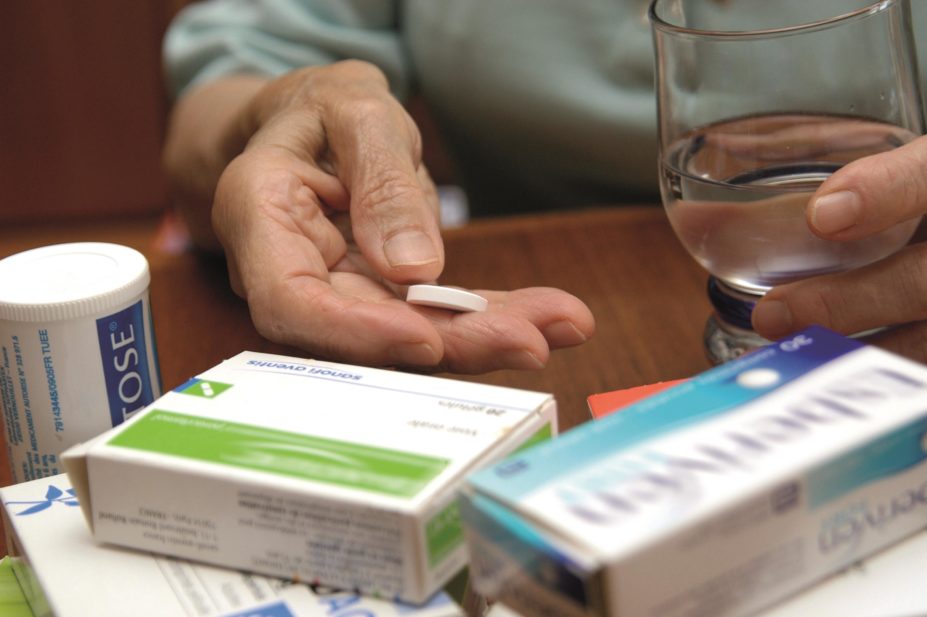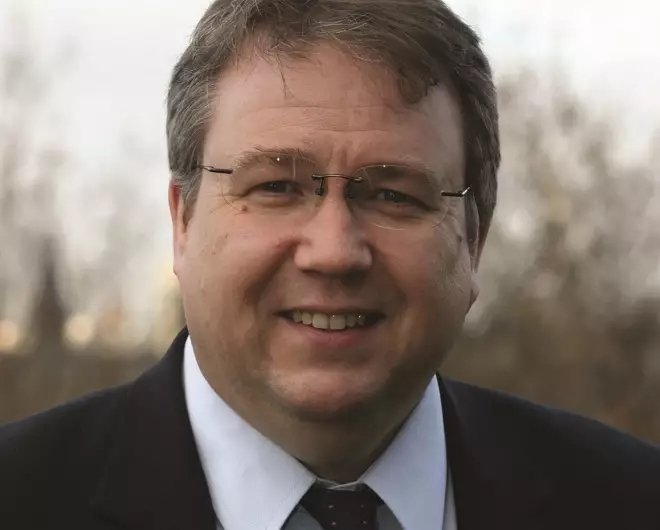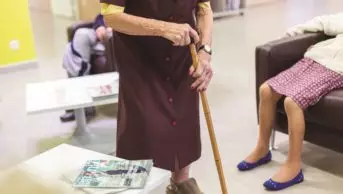
incamerastock / Alamy Stock Photo
Around 50% of GPs are not confident that their elderly patients are taking their medicines correctly three months after their last consultation, according to a survey of 200 GPs conducted on behalf of lobby group Pharmacy Voice.
GPs also admit that their elderly patients are taking too many medicines — GPs were asked what percentage of their patients aged over 75 years who were taking four or more medicines would benefit from taking fewer medicines: the mean response was that half (50.3%) of patients could benefit from taking fewer drugs.
The survey findings appear in a report entitled ‘Dispensing health in later life’ published on 2 November 2015. They highlight that most GPs (92% of survey respondents) want more support from community pharmacy teams to help their patients with medicines management.
The findings have led Pharmacy Voice, which represents several community pharmacy organisations, to call for a review of the current cap on medicines use reviews (MURs), which are conducted by community pharmacists in England under the community pharmacy contractual framework. Under the current contract between the NHS and community pharmacies, funding for the service is cut once a pharmacy reaches its quota of 400 reviews.
The report recommends MURs should be carried out by pharmacists every six months for elderly patients taking four or more medicines and each time such patients are discharged from hospital. It also calls for urgent national discussions between pharmacy and GP leaders to develop more professional collaboration around medicines management and better information sharing that would allow community pharmacists to read and add clinical information to the patient summary care record.

Source: Pharmacy Voice
Rob Darracott, chief executive of Pharmacy Voice, wants GPs to actively encourage older people to access their community pharmacy to help with their medicines management
“Community pharmacy teams can already provide MURs, but awareness is low,” says Rob Darracott, chief executive of Pharmacy Voice. “In a year’s time, we would like to be in a position where GPs are actively encouraging older people to access their community pharmacy regularly to help with their medicines management and we have reviewed the current cap on medicine use reviews.”
The research, conducted by research company MedeConnect in October 2015, was based on the results of an online survey of 200 GPs and follow-up interviews with 20 GPs, pharmacists, commissioners and others. It was commissioned by Pharmacy Voice as part of its Dispensing Health campaign and is supported by the NHS Alliance, which represents primary care, and Care England, which represents care service providers.
GP Michael Dixon, chair of the NHS Alliance, says that while community pharmacy teams are well placed to undertake regular MURs, there should be collaboration with GP practices.
“The exact delivery must be worked through carefully with general practice colleagues to make sure our older patients aren’t sent round the houses, and are advised by the right health professional, at the right time, and in the right place,” he says.
“We are nowhere near quantifying the effects of taking multiple medicines concurrently, especially in older patients. Many are confused by the sheer numbers of medicines they have been prescribed, and their health and quality of life is adversely affected when these medicines fail to treat the underlying condition because they are not taken correctly.”
Sandra Gidley, chair of the Royal Pharmaceutical Society’s English Pharmacy Board, says the findings confirm other studies that show older people, especially those in residential care, “get a poor deal with regard to their medicines”.
“There is no doubt that we need pharmacists to be involved across the system to address this, including in GP surgeries, care homes and community pharmacy,” she says, adding that the English Pharmacy Board supports lifting the cap on MURs for older people. “Actually, we would go further and lift the cap on MURs across the board to make sure they are given to those most in need rather than cutting the funding for this service once an arbitrary number of patients have been seen each year.”
Sue Sharpe, chief executive of the Pharmaceutical Services Negotiating Committee (PSNC) — which negotiates on behalf of community pharmacy — says the PSNC wants to see pharmacy services commissioned to support frail and older people in their own homes, particularly after being discharged from hospital.
“A greater role for community pharmacy in this area could lead to better care for patients following discharge from hospital, prevent hospital admissions and readmissions and help to tackle bed-blocking in the NHS, and this latest report provides yet more validation of this,” says Sharpe. “We believe it is massively important to an NHS in desperate straits to use community pharmacy in this way.”


